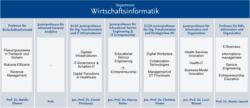New Paper on Matthew Effects in Digital Infrastructures
News from Apr 08, 2025
We have published—to the best of our knowledge—the first empirical paper that rigorously and quantitatively demonstrates the existence of Matthew effects ("the rich get richer, the poor get poorer") in the growth of information systems within digital infrastructures.
While there has been tremendous qualitative evidence dating back to the early 2000s (notably from Claudio Ciborra and Ole Hanseth), little empirical data has been collected that clearly solidifies this effect and could enable differential (managerial) treatment of systems based on their growth trajectories.
Together with an experienced team of co-authors (Till Winkler, Karl Akbari, Abayomi Baiyere), we have addressed this gap using evidence from nine years of case data tracking the evolution of 217 systems in a media firm, as well as further complementary data.
If you speak or write about self-reinforcing mechanisms in digital infrastructures (for example, building on the insightful paper by Ola Henfridsson and Bendik Bygstad), we would appreciate it if you considered our findings as empirical evidence supporting the existence of Matthew effects, their strength, and their functional form.
Additionally, we see opportunities to advance this important stream of research further through qualitative and quantitative studies examining Matthew effects in various digital infrastructures, industries, and settings around the world.
We believe these insights are important because they not only help explain phenomena like criticality traps—where systems remain operational despite capability shortcomings or poor usability—and redundancy slips—where promising innovations are abandoned—but also challenge linearity assumptions commonly found in information systems scholarship.
You can read the paper here:
https://lnkd.in/eEmdsZKi


